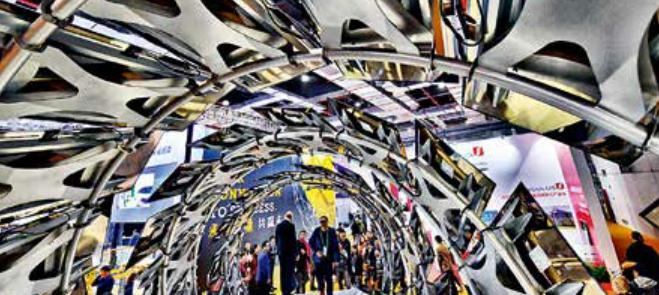China’s Economy A Singular Voice in the Choir
2019-08-06byWangShuguang
by Wang Shuguang



Over the past seven decades, Chinas relationship with the world has undergone profound changes. The history of Chinas participation in globalization can be divided into three periods: The first period lasted from 1949 to 1978, when China focused on independent development and avoided falling into the trap of globalization. The second period lasted from 1979 to 2001, when China began embracing the process of globalization. The third period started in 2002 and continues to present day: China is playing an active role in guiding globalization and proposing construction of a community with a shared future for humanity.
Independent Economic Development
The founding of the Peoples Republic of China in 1949 marked a milestone for the countrys national independence and sovereignty. It ended Chinas century-long status as a semi-colony of Western powers and kicked off a new journey of national independence and rejuvenation.
Facing the Cold War and a long-term embargo by Western countries, China proceeded to pursue independent economic development and industrialization. The embargo imposed by more than 40 member states of the Parisbased Coordinating Committee for Multilateral Export Controls failed to constrain Chinas development. Instead, it only motivated China to develop its own complete industrial system. As China took action to overcome the Western embargo and explored overseas markets, priority was still placed on expanding the domestic market. To make up losses caused by bans on imports on the embargo list, China accelerated research and manufacturing of industrial products to replace those commodities. In this process, it expanded exploration of domestic resources and drove construction of a complete industrial system.
At the time, the independent development strategy exempted China from the negative impacts of the unfair international trade system because its economic and diplomatic strength remained weak. This blessing in disguise helped the country avoid becoming dependent for economic development and being exploited due to unequal international division of labor as many emerging national states in Asia, Africa and Latin America have experienced after World War II. The ultimate result of the Western embargo was forcing China to design a complete, systematic and independent industrial system and a comprehensive industrial chain covering heavy industry, defense industry and light industry. Chinas effort in this area laid a solid foundation for the formation of the countrys independent, self-reliant and self-sufficient industrial system and economic development strategy.
Active in Globalization
Following the beginning of reform and opening up in the late 1970s, China adopted a strategy of “actively participating in globalization” after changes in the international landscape. Ensuring that reform and opening up complement and boost each other became the main tone of this period. Measures such as introduction of foreign capital, reform of the foreign trade system, opening up of the financial sector and internationalization of the RMB all aimed to drive reform of Chinas domestic systems by introducing external elements. By participating in globalization, China has not only deepened communication with other countries in the world, but also reformed and innovated.
During the period, China participated in globalization in a comprehensive and intensive manner across a wide array of fields. China strove to introduce foreign capital, the overwhelming majority of which was long-term foreign direct investment (FDI). This is a principle China has continued to uphold in the introduction of foreign funds, sharply contrasting some Southeast Asian countries which focus on introducing shortterm investment and capital market investment. At the same time, China introduced many advanced management ideas and methods as well as advanced technologies and equipment from Western countries. The amount of foreign capital used multiplied exponentially over two decades, making China one of the top countries attracting the most FDI.
This period also brought rapid growth in Chinas foreign trade. After a long period of painstaking negotiations, China officially joined the World Trade Organization (WTO) as its 143rd member on December 11, 2001. The lengthy process of China seeking WTO entry was a process of Chinas economy increasingly opening up to the outside world and Chinas economic system continuously deepening reform. It was also a process of China fighting against international trade rules formulated around Western values and benefits. In consideration of long-term strategies, China made certain compromises in the process to obtain entry into the international market, enjoy the benefits of globalization and gain a greater voice in global affairs.
China has already evolved into the worlds largest trader—an achievement worthy of pride. Fast-growing foreign trade has become the most important drive for accelerating Chinas economic growth and transformation, making it impossible for China to ever become secluded again. It is deeply participating in international commodities production and transactions.

New Globalization
Since the beginning of the 21st century, especially after the 18th National Congress of the Communist Party of China (CPC) in 2012, Chinas strategy has transitioned from “actively participating in globalization” to “actively guiding globalization.” Undoubtedly, China is now attaching unprecedented importance to internationalization. The country is more open and more deeply integrated in world economics than ever before.
China is working hard to promote the Belt and Road Initiative. From the perspective of global economics, politics and culture, the Belt and Road Initiative is a concept offering great vitality and exerting a profound impact. With policy coordination, infrastructure connectivity, unimpeded trade, financial integration and closer people-to-people ties as its main goals, the initiative upholds the concept of “open regionalism”and stresses principles of extensive consultation, joint contribution and shared benefits, a radically different philosophy from the hegemonic mentality. The Belt and Road Initiative is a global strategy fostering mutual trust, connectivity and sharing, which is in everyones interests and brings countries closer together by standing them shoulder to shoulder.
Globalization has now reached a new stage. China must continue expanding opening up and international cooperation and deepening interaction with the outside world, including economic and cultural exchange. China must more deeply integrate with the international community. Such strategies conform to the needs of the international community as well as Chinas. The rise of a great nation relies on openness and inclusiveness, not isolationism and exclusiveness; it should not rise at the cost of the decline of neighboring countries but climb alongside other nations through win-win cooperation. Traditional Chinese culture is noted for its remarkable inclusiveness and can serve as the spiritual foundation for China to rise as a major economic powerhouse in the world. This is one great advantage of China.
In November 2012, the report to the 18th CPC National Congress proposed building “a community with a shared future for humanity.”It was the first time the concept was featured on an important document of the CPC, and the phrase later became an important guiding philosophy of China to coexist with the outside world in this new era. As globalization enters a new stage, leveraging its judgment of the international situation as well as its historical accumulation and cultural tradition, China has formulated solutions with Chinese wisdom to fuel the long-term development and prosperity of the world. On February 10, 2017, the concept of building a community with a shared future for humanity was incorporated into a UN resolution for the first time, and subsequently into a resolution of the UN Human Rights Council. The introduction of the concept reflects the inheritance, refinement and sublimation of traditional Chinese historical and cultural genes in contemporary times, sums up Chinas experience in development over the past 70 years, and evidences the changes in Chinas economic, political and cultural status in this new era.
Currently, the international economic and political landscape is displaying an obvious tilt towards anti-globalization. In this context, Chinese leaders have stressed on many occasions that globalization is an irreversible trend as they call on countries around the world to strengthen consultation through multilateral platforms and strive for integration and mutual promotion of economics, politics and culture. Against an international backdrop of increasingly complicated globalization, China is striving to work with various countries to build a community with a shared future for humanity, a drive that has substantial historical and global importance.